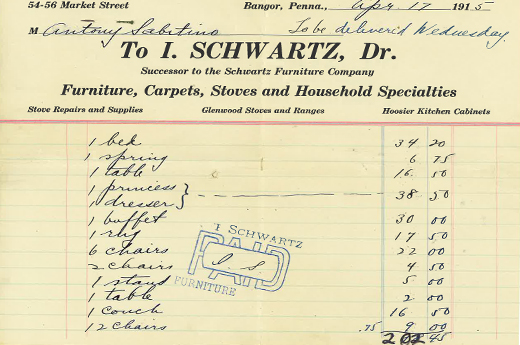by guest blogger Renee James, essayist and blogger
On April 17, 1915, my late uncle’s parents, Tony and Anna Sabatino, selected and purchased furniture to fill their home as newlyweds. Their entire order, totaling $202.45, included the following, and I have the handwritten receipt to prove it:
- 2 tables: $16.50 and $2
- 1 stand: $5.00
- 1 princess bedroom dressing table / 1 bedroom dresser: $38.50
- 1 buffet: $30.00
- 6 chairs: $22.00
- 2 chairs: $4.50
- 12 chairs: $9 or .75 each
- 1 couch: $16.50
- 2 rugs: $17.50 and $8.00
- 1 spring: $6.75
- 1 bed
The bed was a gorgeous, sturdy double-size frame, and brass from head to foot. It was also the most expensive single item on the list: $34.20.
More than 98 years later, as we settled my aunt and uncle’s estate, I took the bed. When we brought it home, the brass was a color that can politely be described as having “the patina of age,” but would more accurately be called army gray-green, plus a finish I called “the perfect blend of murky and dull.”
I was undeterred. With brass polish, an old toothbrush, a pile of clean cloths that quickly turned black and green, and windows thrown wide open, I spent evenings and weekends wiping, polishing, and repolishing the headboard and footboard until they gleamed. After almost a century, there was not a nick on it, not a scratch. It was pretty much perfect.
Tony and Anna also owned a Sessions Mantle Clock of unknown vintage. It may have been a wedding gift, or they may have purchased it around the time they furnished their home. I never saw it working at my aunt’s house, since it was positioned on top of the kitchen cabinets. After decades of silence, it now sits on a shelf adjacent to every bit of (confounding) entertainment technology in our family room.
What I love about the clock is that unlike every single gadget that surrounds it, I know exactly how the it works. It doesn’t blink. It doesn’t glow. It depends on not one satellite for accuracy, nor on one voltage amp of electricity. It doesn’t have a remote control (or three) and features no menu. It makes noise because one object strikes another, not because it has a sound programmed into its software. A tinkling bell announces the half hour, and sonorous “bongs” count off each hour.
I’ve learned how to wind it weekly to reach just the right amount of tension in the brass springs, and how to use the small end of the key to adjust the time if I find it runs fast or slow. In just a few weeks, the ticking and chimes of the clock have become part of the soundtrack that says “home” to me.
I’ve been thinking about the bed and the clock a lot lately. Yes, they remind me of my aunt and uncle (and Tony and Anna), and I cherish them for that reason, but they do more than that. They are real-life, hands-on proof that not everything is disposable; not everything becomes entirely outdated and useless in a matter of months. I’ve never seen a municipality or school schedule a “turn in your old brass bed” day or read a notice about a recycling center accepting antique wind-up mantle clocks.
But I’m a little fearful as well. When I explained the workings of the clock to one of my sons, and showed him how to wind the springs, he asked: “Isn’t that a lot of trouble?” When I showed off the brilliant brass that resulted from my elbow grease, another asked if the finish would stay or if it needed repeated polishing. Both fair questions, I guess, but they voiced their default position on many things: If it’s not automatic, if it’s not wired, if it’s not maintenance free, are we sure it’s worthwhile?
This thinking isn’t specific to their generation—I get that. Society seems to react to “progress” similarly, from doubts about the horseless carriage to skepticism about Google Glass. I’m certain thousands of 1960s-era parents begged their children to get those transistor radios away from their ears before they went deaf.
Back to the unasked question: Is it worthwhile? Well, here’s my answer to my sons—and no, it’s not in the spirit of “Come the revolution….” I hope when they’re my age that they still know what authentic means. That they recognize craftsmanship, and not just because the latest technology (assuming anything is still handheld) comes in a sleek new package that’s 0.006 ounces lighter than the previous version. I hope they know that not all possessions are disposable and some things can outlast a generation—or two or three—and still be as functional as they ever were. Finally, I hope they see technology as useful, even as amazing and critical and phenomenal, but always, always temporary at best.
And some day, when they’re cleaning out our house and choosing their own keepsakes, I hope someone really, really wants that brass bed the same way I did—and carefully polishes it back to perfection. I also hope someone loves the Sessions clock and winds it dutifully each week. For all the same reasons I did, way back in 2013.
 Renee A. James works at Rodale Inc. and also wrote an award-winning op-ed column for The Morning Call, the Allentown, PA, newspaper, for almost 10 years. Her essays were included in the humor anthology, 101 Damnations’: A Humorists’ Tour of Personal Hells (Thomas Dunne Books, 2002), and are also found online at Jewish World Review and The Daily Caller. Her blog, It’s Not Me, It’s You, addresses topics that mystify her on a regular basis.
Renee A. James works at Rodale Inc. and also wrote an award-winning op-ed column for The Morning Call, the Allentown, PA, newspaper, for almost 10 years. Her essays were included in the humor anthology, 101 Damnations’: A Humorists’ Tour of Personal Hells (Thomas Dunne Books, 2002), and are also found online at Jewish World Review and The Daily Caller. Her blog, It’s Not Me, It’s You, addresses topics that mystify her on a regular basis.





Ah Renee. I was telling my husband just 2 days ago at breakfast, that I can do without the computer. Since I just started using the gadget 4 years ago (I know, a late bloomer) due to my husband’s insistence, I do more on-line. He claims that I cannot, at this point in time do without the computer. I said “Yes I can,” and he doubted me. I said that I can go back to writing letters. I miss writing letters to people. I also said that I can use our old landline phones (which I still have plugged in), and do my banking at the bank. He thought about it for a moment, then shook his head yes, that was understandable. I told him that I can do without many things. I hate gadgets that you have to constantly purchase or try to update, because they do cosmetic updates and change a couple of this and that in order to keep you purchasing. The inventors and manufacturers keep getting richer and richer, and we are crazy enough to keep buying their wares, and for what? To dispose of things in 6 months to 1 year after paying hundreds of dollars? I barely wanted a cell phone, but it does have its virtues. It is the only technical thing that I own outright. The computer belongs to my husband. I refuse to jump on the ‘technical bandwagon’ because everyone does.
Going through my grandmother’s property after her death, I found some things that I kept of hers that kept her close to me just by seeing them. A pretty Christmas wreath with a candle for the table, a jewelry box, etc. Little things. If something breaks, I can repair it myself or replace it for less than what a person pays for the cheapest cellular phone. I don’t need to call the GEEK SQUAD at $130.00 plus, just to come out repair it for me.
Some things are worth holding on to, just because, as you say, it doesn’t glow, weigh less and less every year, buzz, whistle, do flips and spin, doesn’t mean that it has no value, monetarily, sentimental, or otherwise. Maybe for this generation it doesn’t, but they are the worse off and sadder for it.
Amen to everything you said. My cell phone makes and receives phone calls, it doesn’t take pictures or text or anything else. I’ve had it for 6 years and will keep it until it dies, (or I do). I do love my computer, but I love my grandmothers teenage ring with her initials on it much, much more!
Thanks for the notes of solidarity, Alice and Donna. My sister alluded to the fact that we are probably the last – or next to last – generation who will have tactile memories of using non-tech items on a daily basis. I think that’s worth cherishing in some way, maybe through some of the things that we hand down from person to person to person.
Appreciate your feedback and kind words.
Renee, I believe your sister is correct! It is sad, but that’s the way of the world now.
I enjoyed your story as it reminded me of my mother winding her precious sessions chimes mantle clock growing up. I agree that today’s generation lives such a disposable life. I don’t have many possessions myself but I do have a few old things that I will not part with such as an old wooden dresser from my grandmother and an old treadle sewing machine they were well made – to last and they still work just fine and I use both .